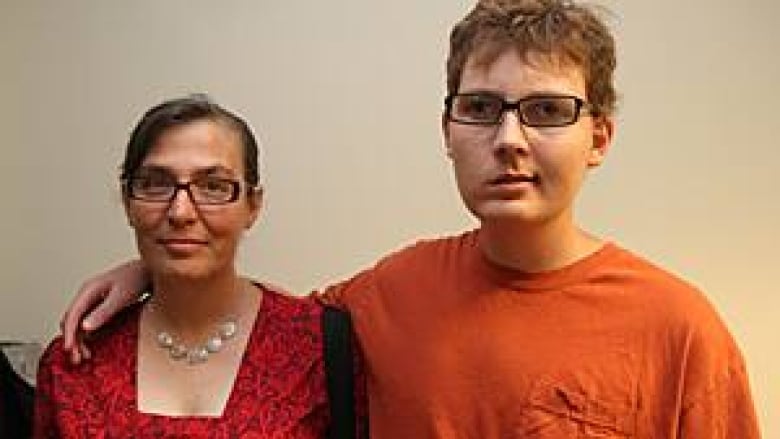Young brain tumour patients visit Hamilton research labs
Researchers study human stem cells to understand tumours

Max Koomen was 14 when Dr. Sheila Singh asked him for one thing he was happy to be rid of — his brain tumour.
Then a ninth grader at Sir John A. Macdonald Secondary School, Koomen was diagnosed in January 2008 with pilocytic astrocytoma, a tumour that most often occurs in young adults.
After Singh removed a large portion of his tumour in surgery, the neuroscientist asked if she could use it in her stem cell research lab in the McMaster Stem Cell and Cancer Research Institute.

"I thought, I don't need it anymore. Why have it?" Max recalled.
Koomen and his mom Arlene were among the 20 invitees who toured Singh's labs on Friday. Many of the invitees had donated their tumours to her research project. The invitation was extended to the local support group b.r.a.i.n.child, for families and friends who have cared for a child with a brain tumour.
The guests were treated to a slide presentation where they heard about Singh's research. Scientists on her team focus on human stem cells, which means they need patient samples to study.
Their goal is identify which cells and genes promote brain tumours, with an ultimate goal of learning how to better treat or even cure the ailment.
That's a goal the Koomens can get behind.
The family, who live near Bayfront Park, became concerned in early 2008 when Max started getting what the initial doctors he saw thought were migraines. An MRI revealed a large tumour in the lower left area of the back of his head. There were also small nodules throughout his brain and spinal cord, his mom Arlene said.
Step-by-step recovery
A portion of it was removed in surgery, but surgeons couldn't get all of it. So Max underwent radiation too. He spent nearly three months in McMaster Children's Hospital.
Recovery was difficult. The muscle damaged by the tumour affects motor control, which meant he had to re-learn how to walk. He still has double vision and his eyes are sensitive to sunlight, and he can't eat certain foods.

Otherwise, 19-year-old Max is healthy. He is finishing high school, which has been delayed by his medical problems. He is eyeing a career, perhaps in environmental science.
Knowing that his tumour helped researchers understand the illness has helped, Arlene said.
When it came to helping Singh's research, Arlene said "there wasn't a thought in my mind" before she agreed.
"If it gives a little bit of an answer as to why these things happen and finding a cure, why not?"
Giving back with knowledge
Singh feels an obligation to give back to her patients by helping them understand her research.
"We work primarily with human cells," said Singh, who sees about 40 children a year. "The only reason I can do this is because of patient samples.
"I'm accountable to these patients and families because these are, after all, my patients and my families."
In seeing the presentation and getting a tour, "I hope they'll get a sense of further drive and motivation that this is something we can cure."
Singh doesn't see a cure in the immediate future, but it's her team's ultimate goal.
"We still have so much to learn about the biology of brain tumours, but it's something to drive toward."

